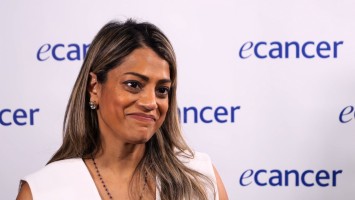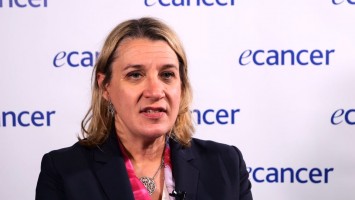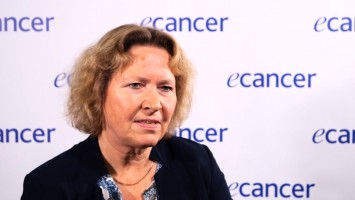ASCO 2011
Highlights from 2011 and ASCO’s future
Professor George Sledge – Indiana University, USA
I view this as the year of small tumours. I you look at our plenary session, our plenary session is commonly dominated by breast, lung, colon, prostate, you name it. This was the year of GIST and melanoma and childhood tumours and actually, as a breast cancer doctor, I found that a very refreshing difference from any of our past meetings. Clearly the star of the show was melanoma. You and I have been around a long time, could you have imagined two years ago that within 12 months we would have two drugs that improve survival in randomised controlled trials in melanoma? It’s just astonishing and to me it speaks to the potency of understanding biology for cancer. I look at what I think was the abstract of the show, which was the BRAF inhibitor, the vemurafenib, and even though it’s not going to cure melanoma, we already know that, just the very fact that you can take these patients with far advanced melanoma and within days or weeks shrink their tumours to such a huge degree is just a stunning achievement and a wonderful one for targeted therapy.
It’s a bit like cytotoxics in the old days, it’s a bit like cyclophosphamide intravenously and mediastinal masses shrinking before your eyes.
Indeed, it is fascinating. I have been following this story for a while; one of the great pleasures for me this year, and I started the year as a breast cancer doctor, I was as hyper-specialised as one can be, and I ended the year as a generalist because as President of ASCO you have very little time to read your own particular specialty but you are forced by necessity to read everything else. And so I have been following the melanoma story very closely all year, and in particular have been following the biologic story. What’s fascinating to me is before the phase III trial was ever presented for vemurafenib there were already six well defined mechanisms of resistance, and defined in the clinic, and these weren’t cell line mechanisms of resistance, these were biopsies in patients who had actually received the drug and we already have six mechanisms of resistance. I always tell my Fellows that one dumb tumour is worth ten smart oncologists, and I think this is certainly a case of that. But it is also fascinating to me that before the phase III is even presented, our ability to do genomic analyses has already allowed us to drill in on what the problem is. I am perhaps depressed by the fact that there are already six mechanisms of resistance but I’m thrilled by the fact that several of those mechanisms of resistance are likely to be drugable, if not already in the near future. So, having seen this a long time, we can already see the way forward. You have two new drugs that work by totally different mechanisms of action, both of which prolong survival for advanced patients. Like all oncologists, whenever we have two new toys to play with, the first thing we want to do is to combine them, and the second thing we want to do is to move it from advanced disease to early stage disease where, perhaps in an adjuvant setting, that prolongation of survival will translate to a cure for some patients. So for me, this has been the year of melanoma.
And the move from advanced to up front was shown nicely with the ipilimumab randomised trial with and without dacarbazine, and I thought that was elegant and quick. It’s not easy doing melanoma studies especially once you’ve stratified them and if you are slicing them into particular biological subtypes, or genotypes, or whatever then it gets interesting. I talked to Edith Perez about the triple negative breast cancer study and I said, there’s not very much here. “Oh no,” she said, “it is getting so difficult. There are now eight kinds of triple negative breast cancer,” so that’s just one year’s worth.
At least.
So that’s what’s happening there. Now, you talked about smart and dumb tumours in your presidential address which I thought was really, really neat, I thought it was a most original observation. You did talk about this blistering avalanche of technology which is impacting on the patient population at the bottom of the hill, however you did, I thought very fairly, point out that this is a western civilisation luxury that we are enjoying and that we have a totally different challenge in the low income countries and developing countries. You very generously, I felt, set up the ESMO/ASCO Symposium this morning on just that topic; do you have any reflections on that now you have heard the really bad news?
Yes, it was fascinating to me. For your viewers, the ESMO/ASCO Symposium brought together just a wonderful and talented group of leaders in this area. We heard about the epidemiology of cancer in the developing world which is truly shocking and frightening. If we have a tsunami of data coming from the genomics, just based on demographics, we have a tsunami of cancer patients headed our way over the next two decades which we are totally unprepared for at every level. At the same time, and this is why I think it is shameful to give in to despair; it is easy to view the world in very Hobsian terms, easy to view the world as a place of haves and have-nots and the have-nots are always going to have the boot of reality ground into their face. But the truth is we actually have a lot of solutions. I think the number I heard was 30% of cancer in low and middle income countries has a viral etiology. There is no reason we can’t significantly impact that through anti-viral strategies, vaccine strategies and other anti-viral agent strategies in the same way that our AIDS colleagues have. Much of the death and morbidity that’s seen in low and middle income countries in addition is easily amenable to fairly standard treatments if only they were applied, and fairly simple treatments, not high tech modern western world treatments but actually probably more 1960s or 1970 levels western world treatments, most of which should be within reach of many of these countries. So I actually am hopeful that with a little organisation, a little political will, we should be able to go forward there.
And of course there are educational challenges because many of these patients come along with disease that is far too late for a whole lot of reasons: some of them are cultural, some of them are language, some of them are understanding and so on. I certainly am committed to take ecancer.tv into all those countries; we already are reaching 201 countries with these broadcasts.
Wonderful.
So I think this is something we just have to try. At a meeting in Lyon a couple of weeks ago, Peter Boyle presented some really expert people who particularly have been developing twinning between American universities, Indiana and Brown for instance, and Kenya, and I was seriously impressed by that. This is not flash in the pan stuff, in and out, this is 15-20 years of commitment, swapping ideas, swapping people. I really believe that the ASCO membership, the ESMO membership and so on, these are fairly affluent people and affluent universities and institutes, and I wonder whether we shouldn’t be carrying the flag for twinning.
I believe so. Indiana University is my institution of course, so yes.
It was an open compliment.
Yes, thank you. So we have a long standing relationship with Eldoret in Kenya and, it sounds trite, we have of course learned as much from them as they have learned from us and we have been working with the hospital there for a long time, initially with AIDS related malignancies and with AIDS, but increasingly with the wide array of cancers that are present there. What has become obvious to me, and obvious to my colleagues, is the crucial importance, not of swoop in, swoop out onco-tourism, as Peter Boyle called it this morning, but rather the importance of developing an infrastructure, an infrastructure partly physical but even more so an infrastructure based around having the right health care professionals in place - the nurses, the local physicians who provide the basis of support there on a chronic basis. I am not a pessimist on these things, I think there are real solutions there, we just need to have the will to apply them.
President Sledge, thank you very much indeed.








